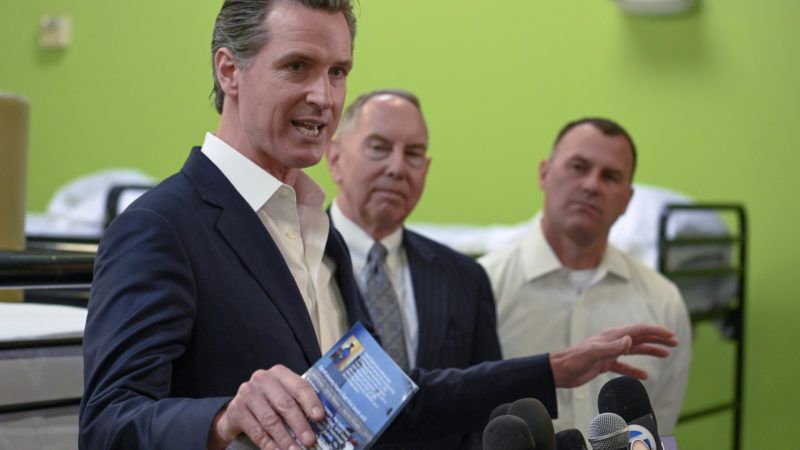Gavin Newsom Orders 40 Million Californians To Stay Home During Coronavirus Crisis. Is He Right To Do It?
The spread of COVID-19 is making once unthinkably extreme policies seem like the least bad option.

California, at long last, has decided to ban everything. On Thursday evening, Gov. Gavin Newsom (D) issued an order for all 40 million state residents to stay home in an attempt to stem the spread of the COVID-19 virus.
"We need to bend the curve in the state of California," Newsom said in a televised address last night, referring to the consensus among public health experts that rapid community transmission of the virus will overwhelm the U.S. hospital system. "There's a recognition of our interdependence that requires of this moment that we direct a statewide order for people to stay at home…we are confident that the people of the state of California will abide by it."
The governor's directive requires people to stay in their homes unless going out for certain necessary activities. Grocery stores, pharmacies, laundromats, banks, and gas stations will remain open. Workers in 16 federally recognized critical infrastructure sectors are also exempt.
Newsom said it was still OK to venture outside so long as appropriate social distancing practices are observed. But unless you're walking your dog or running to Costco, the standing order from California's state government is to stay indoors.
The Los Angeles Times calls this mandatory directive "an unprecedented action in modern California history."
The practical effects of the governor's order remain to be seen. Newsom noted in his address that 21.3 million Californians were already under similar local lockdown restrictions.
Police are also going to have a hard time telling if people still out and around are partaking in still-permitted essential trips or not. That could mean they take a hands-off approach. It could also mean law enforcement will treat anyone outside their homes with suspicion, opening the door to unprecedented levels of police harassment.
Whether the police will have the capacity or willingness to do that in this current crisis remains to be seen.
Early evidence from local lockdowns in California suggests that enforcement is going to fall hardest on businesses that disobey the directive to shut down, or for whom there's confusion about whether they count as an essential service. The Mercury News reports that police across the state have been forcibly closing everything from bars to gun stores to pool cleaning businesses. Expect more of that.
Even in these extraordinary times, Newsom's order is remarkable. Is it also prudent?
California, like the rest of the country, is scrambling to mitigate the spread of a once-in-a-century pandemic with the potential to kill a million or more people in the U.S. alone. In that context, even many libertarians are accepting government-imposed restrictions.
"We are all walking negative externalities right now that the market just can't fix," said self-described libertarian financier Cliff Asness on Twitter, arguing for aggressive government intervention to stop COVID-19's spread. "What we're doing now is bad policy," the Washington Post's Meghan McArdle said of government-enforced social distancing measures. "It is also the best policy available, at least for the short term."
Others, like libertarian constitutional law scholar Richard Epstein, have cast doubt on the worst-case scenarios being used to justify the extreme lockdown measures being taken to combat the virus.
"Even though self-help measures like avoiding crowded spaces make abundant sense, the massive public controls do not. In light of the available raw data, public officials have gone overboard," Epstein wrote in a Monday column.
Rep. Thomas Massie (R–Ky.) is of the same mind.
Folks are prepping for the impending economic depression induced by our government, because it's going to last longer and cause more suffering than the virus.
People aren't overreacting to a virus, they're reacting to the government's inconsistent and unpredictable reactions.
— Thomas Massie (@RepThomasMassie) March 20, 2020
Even if one agrees that extreme social distancing measures and stay-at-home orders are necessary, they will certainly cause severe economic disruption and leave a legacy of expanded police powers long after the current crisis fades. Newsom's stay at home order, worryingly, doesn't come with an expiration date.
Increasingly, though, it appears there are no good policy options for dealing with Covid-19, only less bad ones.
Rent Free is a weekly newsletter from Christian Britschgi on urbanism and the fight for less regulation, more housing, more property rights, and more freedom in America's cities.


Show Comments (140)